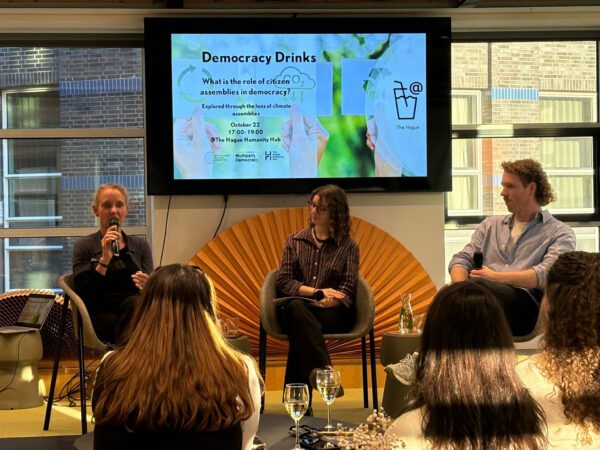
With the urgency of climate policy and citizen engagement spotlighted during last week’s The Hague Climate Week and the COP29 summit, it’s the perfect moment to reflect on last month’s #Democracy Drinks The Hague event on October 22nd. The evening offered an engaging discussion between Marije Dippel, Yuri Impens and those in attendance, addressing the question: what role should participatory democracy have in climate decision-making and what are the challenges involved?
Exploring Participatory Democracy through Citizen Assemblies
The session introduced the concept of citizen assemblies and advisory councils, with Marije Dippel and Yuri Impens as guest speakers. Marije, representing the nonprofit Bureau Burgerberaad, shared her extensive experience in promoting citizen assemblies among policymakers and communities. Yuri, sustainability advisor for the City of The Hague, provided a more localised perspective, discussing his work on The Hague Climate Council presented just last Friday, where citizens directly advise on the municipalities climate policy. Together, they offered complementary insights: Marije shared global examples and overarching perspectives on citizen assemblies, while Yuri spoke to his hands-on experience engaging directly with local policymakers and the public as part of designing the advisory council.
The Value of Citizen Assemblies in Climate Discussions
The conversation began with Marije explaining what citizen assemblies are and how they function, followed by Yuri’s introduction of the climate advisory council the City is developing in The Hague. Both speakers emphasised the value of integrating diverse voices into the decision-making process: voices of people from varied backgrounds, including those from marginalised communities who bring unique perspectives, as well as those with varied interests in knowledge of the topic. In a democratic society like the Netherlands, both Marije and Yuri argued, citizen assemblies or advisory councils offer a pathway for people, regardless of political leaning or experience, to contribute meaningfully to complex policy issues through dialogue and deeper understanding that takes place as part of the process.
To provide background on the topic, Marije began by sharing notable examples which speak to the value of such an approach in democracy. Namely, in Ireland, citizen assemblies helped policymakers realise that public opinion on issues like abortion was less conservative than assumed, ultimately supporting legislation change, while in France, although initially, the outcomes of the citizens’ convention for climate seemed ineffective, the long-term impact is starting to show that such initiatives can shape policy decisions and drive meaningful change.
Why Climate? Citizen Assemblies as Catalysts for Innovative Solutions
In discussing the relevance of citizen assemblies to climate policy, both Marije and Yuri highlighted that citizen involvement can lead to innovative solutions for complex issues. By providing citizens with balanced information and a forum for discussion, assemblies offer unique insights that even well-intentioned government experts may overlook. While governments sometimes struggle to act on citizens’ recommendations without political bias, Yuri noted that involving a cross-section of the public can lead to more inclusive, representative solutions that better reflect societal needs.
Marije responded to an audience question by underscoring that citizen assemblies should be reserved for addressing critical, complex issues due to the time and resources required for their success. Yuri discussed some of the challenges he faced in organising the advisory council, such as ensuring representation across diverse voices and accommodating different languages and accessibility needs. Both speakers conveyed that effective citizen assemblies require careful planning and inclusivity to capture the breadth of public opinion.

Looking Forward: The Promise of Citizen Participation in Climate Policy
In concluding the event, Marije and Yuri left the audience with a balanced perspective: while citizen participation holds immense promise for tackling pressing issues like climate change, there are challenges to overcome in implementing and sustaining such initiatives. The speakers illustrated both the hurdles and the tangible benefits of using citizen assemblies and advisory councils to address society-wide concerns. Through thoughtful, inclusive democratic approaches, these forms of participation can empower communities and foster long-term, impactful solutions to issues that affect everyone.
If you enjoyed this thoughtful breakdown and exploration of the complex topic of citizen participation and input on climate policy, join us on 28 November 2024 from 1730-1900 again at the Humanity Hub in The Hague for our next conversation, this time tackling the critical role of the rule of law in building resilience against hybrid threats.
#DemocracyDrinks is a global event series that brings together advocates and defenders of democracy to participate in knowledge sharing and collaboration. Over 50 cities worldwide participate, with The Hague edition organised by The Hague Humanity Hub, The Netherlands Institute for Multiparty Democracy, and The Netherlands Helsinki Committee.
